
Every drop is precious
United Breweries Limited
With 21 breweries across the country, United Breweries Limited (UBL) understands the value of communities that surround its units. Focus is on long-lasting projects that leave a positive impact on the environment
As one of India’s largest beverage companies, UBL “recognises that inclusive growth is key to the long-term progress of all stakeholders of our society”. Living in a complex environment with different communities having different needs, UBL has a wide range of projects related to water conservation, responsible consumption of alcohol, primary education, healthcare and environment.
Since one size never fit all, UBL has roped in experts and NGO partners to roll out all the activities. It identified the needs of the people living within a 10km radius of each unit and is working on improving the quality of lives in that region.
In the foreword to its CSR report 2018-19, Managing Director Shekhar Ramamurthy’s message defines the path, “As a company, we operate in the complex environment of peri-urban India which faces multitude of development concerns. We prioritise local area development in the specific domains of water conservation, safe drinking water and primary education. Our large manufacturing footprint engages us with over 150 villages and a population of over 1 million people in 13 states... UBL deploys the 4R strategy of reuse, reduce, recycle and recharge for efficient use of water.”
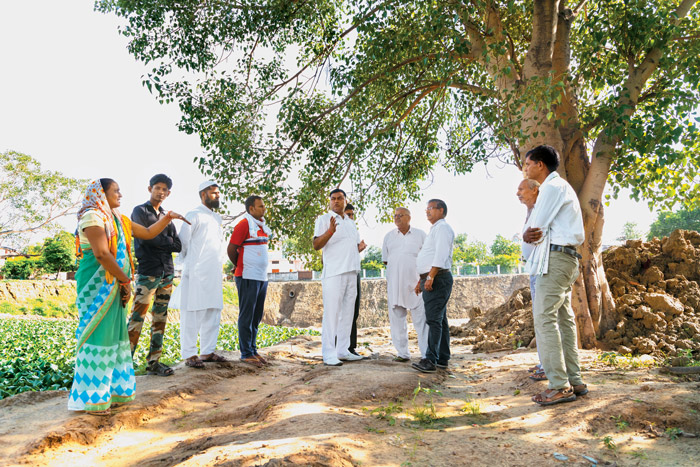
Village Development Committee in Kapriwas discusses the next step
Since UBL is part of a water intensive company, the defining CSR pillar is also water. UBL is fully committed to being a “water neutral” company by 2025. What does this mean? As the company uses fresh water for its products, it ensures that the natural resource for this water is also replenished, so that the country does not face any water shortage in the future. All efforts are towards creating a balance in the water table along with enabling access to safe drinking water, fulfilling agricultural and daily household needs. Since the formulation of the goal in 2015, UBL has made this the pivot around which most of its programmes revolve and evolve. “We have already created recharge potential of 83% of our production needs.
We have, therefore, undertaken projects in water conservation, replenishment and provision of safe drinking water to the communities in the neighbourhood of our breweries. We have also recognised the importance of community involvement towards the fulfilment of this objective and worked with communities in implementation of rainwater harvesting and watershed management projects,” reiterates Ramamurthy.
UBL is working on major projects for rejuvenating water bodies across Tamil Nadu, Maharashtra, Karnataka, Punjab, Rajasthan, Bihar, Odisha, Kerala and Haryana. Rooftop Rainwater Harvesting has been undertaken in over 185 houses in Nandi Gram Panchayat in the Nandi Hills region, Bengaluru. Under the Safe Drinking Water Programme, 47 water plants have been installed in 59 villages, and 1, 565 households have been given water purifiers. It has created a recharge potential of over 47,19,083 KL water per year and benefited over 2,00,000 people till date.
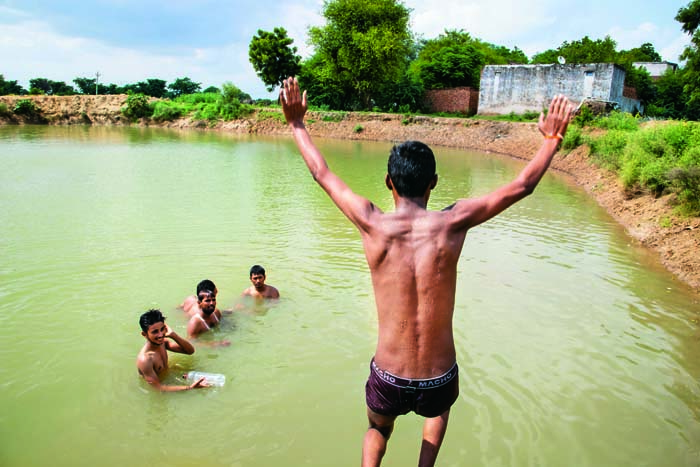
Young ones take a dip in the pond at Khatawali
Experts help identify rain water
catchments. And then the arduous process of rejuvenation or construction
takes place. Building rapport within the community, holding meetings with
the gram panchayat, forming village committees who are deeply involved in
the project and eventually executing and handing over the project takes
time. This could take a few months to a year or two. The focus is on
institutional development and capacity building of village institutions
through community mobilisation.
The successful models have become an
inspiration for many neighbourhoods, which have come forward and wish to
replicate this development in their areas.
The efforts are not limited to the surroundings. Even within the brewery premises, interventions have taken place to reduce fresh water input in production of each hectolitre of beer. Waste water coming out of production is recycled. Tree plantation and cleanliness drives are regularly organised.
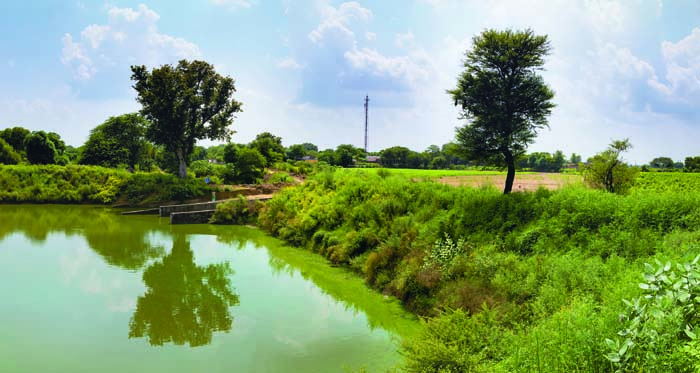
Another rejuvenated pond in the same village
The young and dynamic sarpanch, Umesh, of Khatawali villge, Dharuhera, Haryana, is a progressive man and happy with the way UBL supports the community. The company partnered with Akhil Bhartiya Gramin Utthan Samiti (ABGUS) to rejuvenate two ponds in the village. These were simply waste water and garbage holes when the NGO began work on them. They had to build treatment chambers and redirect the waste water to another pit.
The rejuvenated water bodies help recharge ground water and the clean water can be used by cattle. Now a swimming pool for the children, this water can also be used for recharge in 40-50 acres of land. Butterflies flit around the green walls. There is a plan to plant more trees around this to make it a green cover.Almost 450 families benefit from this initiative. Raj Bala, the sarpanch’s grandmother, maintains the RO water ATM plant, also established by UBL.
The second pond was a challenge as it had collapsed and there was land encroachment too. But now attracts ducks and will hopefully be used for fishery, adding another source of livelihood for the villagers.
In the four ponds that UBL has adopted in Dharuhera, the ABGUS has done all the work of desilting, dewatering for deepening, construction of waste water treatment chamber, recharge shaft and plantation. The other two ponds are in Kapriwas and Joniawas villages.
In fact, the pond at Kapriwas was quite a challenge as it is bigger and almost in the centre of the village. It was the accumulation point for all the dirty water. While the natives are about 3,000,the village has a moving population of almost 15,000 people, being close to the industrial area. Sub ponds were made and a brave committee member, Anil Yadav, volunteered to empty the dirty water on his land through pipes. Once clean, the process of rejuvenation began, and is going on still. Separate drains and chambers have been installed so that the dirty water stays out.
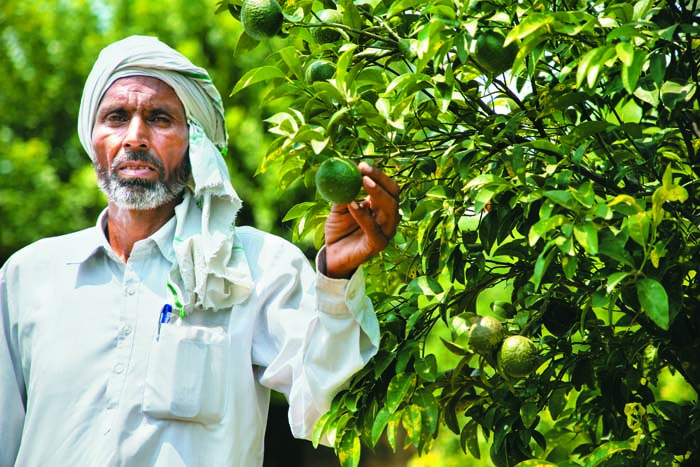
Shamshu now has a fruit orchard and grows vegetables too
Combating drought, socio-economic differences, limited agriculture, the Tijara block in district Alwar, Rajasthan, probably isn’t the easiest of places to step into. UBL associated with Sir Syed Trust for the Integrated Natural Resource Management project. The aim is to empower through agro-forestry, water, livestock development, education and health.
Most of the people living here were given the land during Partition. With a rocky base and unlevelled surface, the land does not catch rainwater. Thus, productivity goes down by 25-30 per cent as compared to land in nearby villages.
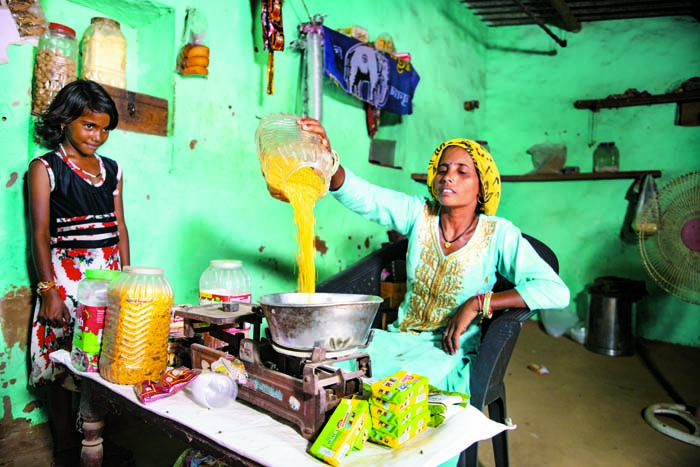
Sunita's daily needs shop is open 24X7 in Bhiwadi district
Levelling of land improved in-situ rainwater harvesting, making it more fertile for use. Altogether, 71 hectares of land was levelled. Farmers were trained to develop fruit orchards. Most planted lemons and kinnows, which can be grown easily. They were also taught inter-cropping and grew some common vegetables like coriander, bottle gourd. The produce is sold in the nearby town of Bhiwadi. The NGO has supported 59 orchards in the area.
Not just good agri practices, the NGO has empowered women in this region too. It formed 27 Self Help Groups (SHGs) covering more than 300 families. The women are taught book-keeping, how to manage community affairs and promote savings. In fact, all the work in the villages has been executed through the SHGs.
Some women have also become entrepreneurs, taking on livelihood related to livestock, dairy, running a shop and more. The NGO has also given seeds for kitchen gardening to 260 families and trained the women in vermi-composting. Seven paals and two ponds have been rejuvenated. Paals or earthen walls are constructed across seasonal nalas to restrict the flow of water during rains. This reduces the erosion and recharges water. Almost 13,705 trees have been planted along the bunds.
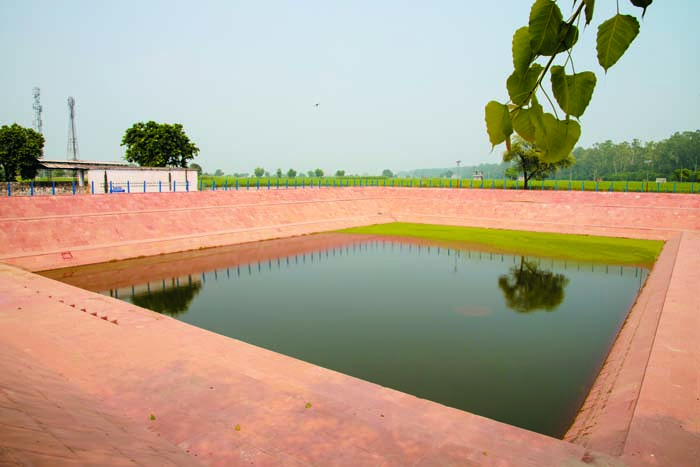
The 100-year-old 'toba', or pond in Katari Kalan, Ludhiana, now beautified with sandstone, has a capacity of 1,62,000 KL
The pond at Katari Kalan in Ludhiana is now an iconic spot, attracting much praise as the 100-year-old dirty ‘toba’ turned into a red sandstone recreational zone. The stone came all the way from Bharatpur. Now, it is a fenced and gated area. People enjoy picnics on weekends here. It is also home to birds, bees and flora. “During the monsoon, the muddy road was unpassable and water would flow into the fields. There was only filth,” recalls Manpreet, member of the Village Development Committee and youth club. “Pind di shaan hai (a place of pride for the village). Everyone who visits the nearby gurudwara, also praises this part. They want a replica in their area too.”
Partnering with The Energy And Resources Institute (TERI), UBL is implementing eight such ‘Pond Rejuvenation’ programmes across Ludhiana, Patiala and Alwar districts. The selected sites were waste water pools and scientific assessment was done with GIS techniques and available data on rainfall and soil type to study the ground water recharge potential.
They were dewatered, cleaned and landscaped. Injection wells were built for groundwater recharge. Now, waste water does not find its way into the ponds. Through the Pond Rejuvenation project, estimated water recharge potential is about 19,51,475 KL per year with 13,614 beneficiaries in eight villages.
The pond in Katari Kalan has a 1, 62,000 KL capacity. Water is used for irrigating almost 500 acres. With solar lights keeping the area well-lit at night, it is a safe place to move through in the wee hours. A clean cremation ground is in the same complex. “Property prices have also risen around this zone now. They were low earlier,” smiles Manpreet, Village Development Committe and youth club member.
The Village Pond Intervention is done with community participation as UBL sees long-term benefits when the stakeholders are involved from the beginning. A Village Development Committee (VDC) is formed, which comprises female members as well. The group is responsible for providing inputs and maintains the project once it is handed over. Messages related to water conservation are painted on the walls giving a constant reminder of this need.
At Mundiya Khurd, Ludhiana, children are busy playing on the swings. This pond complex is the heart of the community. With a recharge capacity of 35,000 KL per year, work is ongoing. The VDC keeps a diligent watch on the area. The families also work on keeping it green.
Pinder Kaur and Paramjot Kaur, two VDC members, are very happy as now they have a healthy green space. “People come for their morning and evening walks here,” smile the two ladies. With approximately 500 homes, this community faced many health hazards earlier. “People dumped their garbage here and the area used to stink. Now, it’s the best place in our community. People come from other neighbourhoods to study this as they also want to develop a similar space.” To create more green space, the community willingly shifted an anganwadi from the area to another part of the village. They are going to keep the area clean is their vow.
The walls of the pond are strengthened with grass. Bio-diversity flourishes as water birds hop around. Some trees have been planted and there is plan for more green cover. TERI hopes to hand over all the projects by 2020.
Surrounded by the scenic Haider Ali, Omkareshwar and Nandi hills, Sultanpet, near Bengaluru, is a quiet village where water is a rare commodity. The water levels are below 1,000 ft, informs Muniayappa, who lives there. Sultanpet comes under the Nandi Gram Panchayat. The three other villages under this panchayat are Nandi, Saigat Kadirenhalli and Madagu Hasahalli.
With most households relying on borewells and farming becoming a problem, UBL has partnered with United Way of Bengaluru for water conservation here. The surrounding Nandi Lake has a capacity of 4 lakh KL and is spread across an area of 38 acres. With highways being constructed in the area, the debris blocked the water channels. This resulted in dense overgrowth of bushes and small trees. Other malpractices included illegal soil excavation and land encroachment.
United Way did a need assessment in 2017-18 and the work to revive the lake is on. The bushes and trees were cleared, land was levelled and the three water channels were cleared. A 600 m embankment was constructed to strengthen the bund. Electric poles were shifted. Once completed, the project will result in increased cultivation (20-50%) on 50 acres of land around the lake. The cost of cultivation will also come down, directly benefiting 500 small farmers.
The NGO also has plans to plant 3,000 trees along the embankment which would add green cover and beautify the area, making it a hotspot for tourists. Around 200 trees have been planted already. There are 14 such lakes in this region. With these efforts, the belt will be greener in the future. The area has almost 100 bore wells and Muniyappa is hopeful that they will soon be recharged along with the village well. “Almost 100 hectares of land will be cultivable,” he emphasises on the foreseen benefits.
United Way has also built 185 individual rooftop rainwater harvesting units. The goal is 350 units. Each tank has a capacity of 4,000 litres. A hand pump is installed too. Muniraju's family of four can now store water to meet 15 days of household needs. Earlier, they would go far to get their water and it barely lasted a week. The one pipeline in the village supplied water only once a week.
Not just individual households, the community space called ‘Gundu Thopu’ now has a new lease of life, as gram panchayat member Nariappa explains. Until the intervention by United Way of Bengaluru, this reeked of filth and mosquitoes. Now, the green space with trees and a water body is a relaxing spot. A sprinkle and drip irrigation set-up has been put in place, and the 222 KL pond has been cleaned to improve ground water level.
Right next to this is the village temple dedicated to the monkey god Hanuman. The temple houses a kalyani, that is, a stepwell. Used primarily for religious purposes, this was restored and cleaned and has a capacity of 1,300 KL. All these interventions have directly benefited the 2,000 people living in Sultanpet.
Nariamma
Sultanpet, Nandi Gram Panchayat, Bengaluru
The sprightly 70-year-old has a household of 10 members.
"We have small
children at home too. The rainwater harvesting unit has made a huge difference,
as we have water for most household."
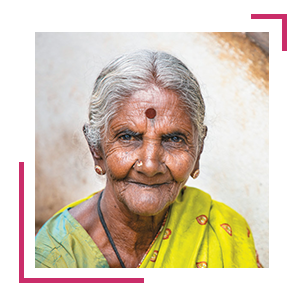
Sabir, Farmer
Bhiwadi District
He is happy with the lemon yield on his land.
"The rocky land was levelled and
then I was taught how to put it to optimum use. Profits have doubled with this."
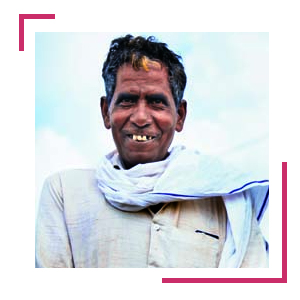
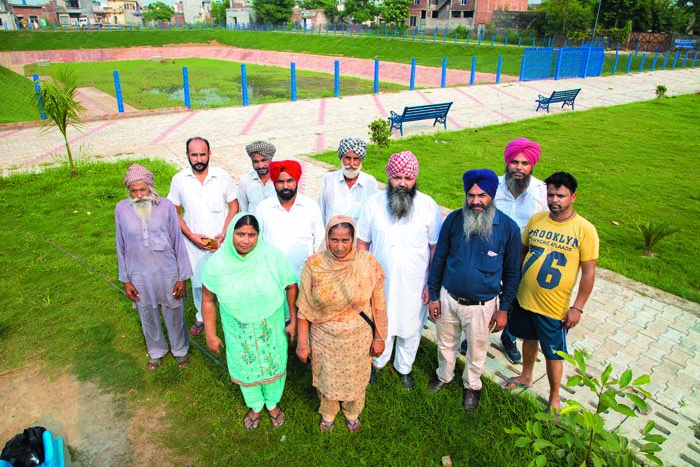
Sound mind, sound health and happy hearts—the purpose of any project is to have a balanced impact. Safe drinking water leads to better health and many villagers have testified to this. Besides this, UBL also holds regular awareness talks and health camps in the villages that it supports. Access to good doctors and free medicines helps the villagers lead a better life.
Primary school education in rural areas is encouraged. The company supports 10 government schools in Rajasthan, maintains the science centres established in one school in Rajasthan and eight schools in Karnataka. In Nagpur, infrastructure development has been initiated. The initiatives have benefitted over 13,000 school children till now. Mid-day meals have been supported for 1,666 children in Mangalore.
As a leader in the alcohol-beverage market, UBL held a week-long awareness programme on “Responsible Consumption of Alcohol” for truck drivers between 2017-19. This was held at the 13 breweries in Tamil Nadu, Kerala, Andhra Pradesh, Maharashtra,Goa, Punjab and Rajasthan. Over 3,144 truck drivers linked to the supply chain were covered under this programme.
Actively involved in natural resource management, UBL received the SKOCH Order of Merit for qualifying among top CSR projects in India for Ecological Restoration of Water Commons and Natural Resource Management. It also received the HR Excellence Awards 2018 for leading practices in CSR by People First. It has also received the prestigious ET Now CSR Leadership Award for Water Conservation.
And the journey continues, for long-term goals need long-term commitments.




